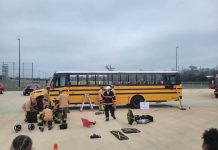Heading into the weekend before Christmas, most are looking to shut down their work computers and finish up any last-minute shopping. Some are even planning a couple of extra days off. But for employees at Atlantic Express headquarters in New York City, the lights that turned off at the close of business this week won’t be coming back on after the holidays.
Senior management informed staff on Tuesday that the Port Richmond office on Staten Island has shut its doors for business. As you would think, there were plenty of tears shed, as many of the employees have worked there all their lives. The news came after a New York bankruptcy court received details of a company auction held over the weekend, as the bankrupt school bus contractor was sold off part and parcel.
But is Atlantic Express truly going away? The official word remains that Atlantic Express’ announcement is ceasing bus operations by the end of the year, but we’re hearing rumors the selling of all assets might not mean the final death knell for the company. Certainly, all indications are at this point that East Coast contracts have ceased, especially in light of a letter sent by the New York City Department of Education to parents this week on a contingency plan for student riders displaced by the company closure, and as we reported previously a bankruptcy court received bids on those routes and assets and has begun the approval process. This leaves other districts in addition to New York City, like Philadelphia, scrambling to approve the new contractors by the beginning of the year.
But what about West Coast operations, such as those for Los Angeles? Does the company have a contingency plan for those? Could a private equity firm may even be involved? Might Atlantic Express re-open its doors, even if under a new name, with a focus on the Western portion of the country?
Time will tell.
 STN contributor Linda Bluth wrote a blog for the National PTA that gives five tips families of students with disabilities that have transportation services written into the IEPs can follow for school bus safety. She suggests they: familiarize themselves with school district’s school bus policies and procedures for students with disabilities; utilize the IEP process to address transportation if individualized services are necessary; ask questions about the specific training received by the bus driver and attendant to meet your child’s needs; provide relevant information about the impact of your child’s disability on the school bus ride, and; have readily available contact numbers of those individuals responsible for the transportation of your child.
STN contributor Linda Bluth wrote a blog for the National PTA that gives five tips families of students with disabilities that have transportation services written into the IEPs can follow for school bus safety. She suggests they: familiarize themselves with school district’s school bus policies and procedures for students with disabilities; utilize the IEP process to address transportation if individualized services are necessary; ask questions about the specific training received by the bus driver and attendant to meet your child’s needs; provide relevant information about the impact of your child’s disability on the school bus ride, and; have readily available contact numbers of those individuals responsible for the transportation of your child.
“The most dangerous part of the school bus ride is getting on and off the school bus,” she explains to readers. “This is referred to as ‘The Danger Zone’ … the 10 feet in front, behind and on each side of the school bus.
“Make sure that your child receives appropriate supervision at all times while in the “‘Danger Zone.'”
Bluth is the quality assurance and monitoring specialist for the Maryland Department of Education and a past-president of NAPT. She is also tenured faculty emeritus for the Transporting Students with Disabilities and Preschoolers National Conference, which is produced by School Transportation News parent company STN Media Group, and is presenting in March on several topics, including how the federal sequester implented last spring continues to affect student transporters.
She is also scheduled to present at the 2014 STN EXPO in Reno, Nev.
There has been little movement of legislation introduced to Congress on Oct. 30 that would recognize hair sampling as an alternate method for testing CDL holders for drugs and alcohol. Drug Free Commercial Driver Act of 2013 would change that, but a report has yet to come out of a House Transportation and Infrastructure subcommittee on highways and transit, where it currently sits along with 48 other introduced bills.
Currently, urinalysis is the only approved method for pre-employment screening. Bus & Motorcoach News pointed out in its Dec. 1 edition that some experts say urinalysis is only effective way in detecting substance abuse during a two- to three-day window. Hair samples, on the other hand, provides a 60- to 90-day window.
David Strickland is out as NHTSA administrator, several news agencies, including The Washington Post, reported last week. Strickland is said to have resigned, but we have heard things might have gone down a bit differently, as in he was forced out. While NHTSA continued to feature Strickland on its web page, no official word on why Strickland left has been made, and no replacement has been named, either.
It will be interesting to see who NHTSA taps as its new face. Strickland appeared several time before the student transportation industry at national conferences such as NASDPTS and NAPT.
Meanwhile, Deputy Secretary John Porcari left the U.S. Department of Transportation and is succeeded by Victor Mendez, who was the administrator of the Federal Highway Administration.
In nearby Virginia, the Harrisonburg School District is saving vital transportation dollars thanks to a successful walking school bus program at Keister Elementary School. During the 2007-2008 school year, Keister received a $500,000 federal Safe Routes to School grant that funded new sidewalks, traffic calming, crosswalks and new signage around the school. After project completion in 2011, the school floated the idea of replacing an entire yellow bus with a walking school bus at a nearby housing complex on Fridays.
But some parents were skeptical — until they received a visit from home-school liaison Sonny Rodriguez, who explained what a walking school bus was and reassured them their kids would be supervised along the way. This personal outreach enabled Keister to eliminate a quarter-mile bus route every Friday and get 100-percent participation for its new walking school bus.
“Our success has also influenced other schools in the city,” said Rodriguez, adding that an elementary and a middle school are promoting walking programs, which might lead to forming their own walking school bus.
Do you have a similar success story to share?
While many children are eagerly anticipating the winter break, a 2-year-old Indianapolis girl with a terminal disease had her wish to attend school come true on Tuesday. Ava Parker rode a yellow bus to preschool and spent the entire day there, playing and learning with other kids.
“When we found out last Monday that our days are truly numbered with her, I wanted to give her what she truly wanted,” Her mother, Kacy Parker, told one local station.
Since being diagnosed with terminal brain cancer at 21 months, Ava has had a tumor removed and undergone chemotherapy several times. The treatment has left her blind in one eye and partially deaf. She was in remission for two months when her family learned last week that she only has a few weeks to live.
At least for one day, Ava had the chance to be a normal preschool student.
“I literally have no words for the amount of joy we have … that we’re able to do this for her. It’s a light in a dark place for her,” added Kacy.
Another child had his wish granted in Debary, Fla., when the City Council agreed to let his family keep pet chickens that have proven therapeutic for him. The 3-year-old boy has autism spectrum disorder. According to Autism Speaks, the Hart family had threatened legal action against the city in federal court for violating the Federal Fair Housing Act, Americans with Disabilities Act and the Rehabilitation Act.
J.J.’s parents said their son has been calmer and more talkative since they brought home three hens as part of the city’s one-year trial program allowing backyard chicken coops. Once the city opted to end the program, the Harts spoke out about the positive impact the hens had on J.J., and both local and online communities rallied behind their cause.
The new resolution only applies to the Harts, so other Debary residents will not be allowed to keep backyard chicken coops.
For all your alternative-fuel fans, check out this video that we found online from the Corpus Christi Regional Transportation Authority in Texas that shows a time-lapse of the construction of a new CNG station.
















